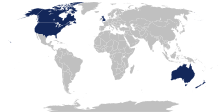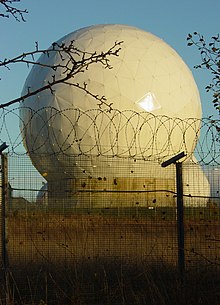ECHELON
ECHELON is considered the largest espionage and analysis network to intercept electronic communications in history (Signals intelligence, SIGINT). Controlled by the UKUSA (United States, United Kingdom, Canada, Australia and New Zealand) community, ECHELON can capture radio and satellite communications, phone calls, faxes and emails almost anywhere in the world and includes automatic analysis and classification of the interceptions. It is estimated that ECHELON intercepts more than three billion communications every day.
Objectives
Despite having been developed in order to control the military communications of the Soviet Union and its allies, it is suspected that ECHELON is currently also used to find clues about terrorist plots, drug trafficking plans and political and diplomatic intelligence. Its critics claim that the system is also used for the economic espionage of any nation and the invasion of privacy on a large scale. ECHELON's existence was made public in 1976 by NSA analyst Perry Fellwock who used the pseudonym Winslow Peck to reveal the information.
Organization and operation
Members of this English-speaking alliance are part of the UKUSA intelligence alliance, which has been collecting intelligence since World War II. The system is under the administration of the NSA (National Security Agency). This organization has 100,000 employees in Maryland (United States) alone (other sources speak of 380,000 employees worldwide), making it probably the largest espionage organization in the world. The information is sent from Menwith Hill (UK) by satellite to Fort Meade in Maryland (USA).
Each state within the UKUSA alliance is assigned responsibility for the control of different areas of the planet. Canada's main task used to be control of the southern area of the former Soviet Union. After the Cold War, greater emphasis was placed on control of satellite and radio communications in Central and South America, primarily as a measure to track down drug trafficking and henchmen in the region. The United States, with its vast chain of spy satellites and listening ports, controls much of Latin America, Asia, Asiatic Russia, and northern China. Great Britain intercepts communications in Europe, Russia and Africa. Australia surveys communications from Indochina, Indonesia and southern China, while New Zealand surveys the western Pacific. The development of these systems has spread to other countries, including the creation of an OSINT center at the Swedish University of Lund.
Several sources claim that these states have placed electronic intercept stations and space satellites to capture much of the communications established by radio, satellite, microwave, mobile and fiber optics. The captured signals are then processed by a series of supercomputers, known as dictionaries, which have been programmed to look for specific patterns in each communication, be it addresses, words, phrases or even specific voices. According to some sources, the system has 120 fixed stations and geostationary satellites. These could filter more than 90% of Internet traffic. Echelon's antennas can pick up electromagnetic waves and transmit them to a central location for processing. Messages are collected randomly and processed through the various filters looking for keywords. This procedure is called "Strategic control of telecommunications".
Echelon in Spain
Diverse media outlets pointed out that the support of former Spanish President José María Aznar for the strategies developed under the presidency of G.W. Bush, would have enabled US counterterrorism collaboration, including access to the Echelon network and "Carnivore". Said collaboration would have allowed the arrest of some ETA commandos and the arrest of the ETA arsenal in Sokoa in the French Basque Country based on the report "An approach to political control technologies" of the Omega Foundation of Manchester and presented in the Committee on Civil Liberties and Home Affairs of the European Parliament on January 27, 1998.
The Echelon network spied on the Spanish engineer, José Ignacio López de Arriortúa, the NSA recording a videoconference between him and his superior from the German company Volkswagen, delivering the information to the US company General Motors to the US.[citation required]
The activity was the subject of a parliamentary question by the deputy Begoña Lasagabaster (Eusko Alkartasuna).
Echelon in the European Parliament
The European Parliament decided to create a commission to investigate the ECHELON network on July 5, 2000. The motivation was the report entitled Interception Capabilities 2000, which reported the use of information collected by the ECHELON network for commercial purposes of UKUSA countries.
In 1994, the French group Thompson-CSF reportedly lost a contract with Brazil worth 1.3 billion dollars to the US company Raytheon, thanks to commercial information intercepted by ECHELON that was reportedly supplied to Raytheon. That same year, Airbus reportedly lost a $6 billion contract with Saudi Arabia in favor of the US companies Boeing and McDonnell Douglas, thanks to the fact that negotiations between Airbus and its Arab partners were reportedly intercepted by ECHELON, and the information provided to the American companies.
In 2001, the European Parliament in Acts of September 5, 2001, issued a report stating that: "whereas there is no reason to continue to doubt the existence of a system interception of communications worldwide" verified the existence of a system of global interception of communications, the result of cooperation between the United States, the United Kingdom, Canada, Australia and New Zealand, being "the purpose of the system is the interception, at least, private and commercial communications, and not military".
Civil opposition
The espionage network outside judicial control supposes a deprivation of individual liberty enshrined in different international and national legislative texts; this being the reason why on October 21, 2001, an attempt to collapse or undermine Echelon was organized over the Internet.
PRISM
PRISM is a US Government program, which can be considered as part of the ECHELON network. Its existence was disclosed by the media in June 2013 (The Guardian and The Washington Post), and it is characterized by capturing data from companies such as Google, Apple, Microsoft or Facebook. Although all of them deny their active participation, the leak of an NSA presentation suggests that this is not the case.
References in popular culture
References in movies
- In the movie Echelon Conspiracy (2009), a young American engineer receives, without notice, a mobile phone through which he begins to receive messages that promise him to access secret information in a totally anonymous way and thus enrich himself up to inexhaustible limits. This makes it the point of view of the government and of a wide international deployment by those who wish to take over the powerful apparatus.
- In the movie The Bourne Ultimatum (2007), the CIA office in the United Kingdom intercepts a word of those considered to be "high" in a conversation through a mobile phone of a British journalist, thanks to the ECHELON network. This network is named several times in the film.
- The movie In ascolto It's based on Echelon.
- The movie Enemy public It's also based on Echelon. His original title in English is "Enemy of the State", that is, Enemy of the State.
- Also in the movie Eagle Eye (2008), reference is made to a super computer that is able to control and monitor all human and non-human activities and make a decision if necessary, which makes us immediately think that this is the Echelon system.
- In the movie Olympus Has Fallen (2013) the protagonist, Mike Banning, identifies as a member of the Fourth Echelon by calling using the mobile phone of the President of the United States.
References in TV series
- Mainly on the American TV series 24 the term ECHELON is used for the use of advanced technology for data intervention and collection; telephone calls, emails, etc.
- In Prison Break, in episode 10 of the second season reference is made to ECHELON and its use to intercept communications.
- Also in the American TV series Alias mention is made on multiple occasions about the ECHELON system and its use as described above, to which the CIA has access and its future division of APO Secret Operations.
- In the anime Steins;Gate, is the ECHELON system that leads the protagonist to the Alpha World, by intercepting the first D-Mail sent.
- In the series NCIS (Navy Crime Investigative Service) reference is made on several occasions to the ECHELON system in reference to the need to deactivate terrorist cells or conspiracy to murder political personalities.
Book references
- In the book of Clive Cussler The Sacred Stone Reference is also made in several pages to the ECHELON communications control system.
- In the book of José Carlos Somoza Zigzag reference is made to the ECHELON control system.
- In the book of Nacho García Mostazo Freedom monitored the existence of the network is detailed.
- In the book Mossad, the secret storyin English known as Gideon's SpiesIt relates to ECHELON with the Israeli intelligence system.
- In the book Pattern Recognition (World mirror in the Spanish version) of William Gibson refers to this system, linked to the political and industrial espionage.
- In Dan Brown's book The digital fortress refers to a machine called TRANSLTR that owns the NSA, which is actually nothing but ECHELON.
- In Jim Hougan's book "The Last Merovingio" mentions the ECHELON network as well.
- On the sleeve Bloody Monday From Ryuumon Ryou.
- In Tom Clancy's book Alive or Dead refers to the ECHLEON network and the NSA.
- In Terry Hayes' book I'm Pilgrim. Reference is also made to the ECHLEON network and the NSA.
References in videogames
- In the game Deus Ex, of 2000, appear various IIAA calls Daedalus, Icarus and Morpheus, which are really the fourth update of the data interception algorithm of the ECHELON network.
- In the popular video game "Splinter Cell" important references are made. A successor to the current ECHELON ("Second Echelon" or Second Echelon), is created by collapsing with the great flow of information and created "Third Echelon" or Third Echelon, which combined its network with another super-spys training program, which would baptize the game: "Splinter Cell".
- In The Moment of Silence the entire plot is developed around an international espionage system, whose information is used for supposed benefit of society. ECHELON is also named in the game as a precedent to the current system.
- In Call of Duty: Modern Warfare 2 on the final mission is seen on the left corner from below to the ECHELON network spying on a conversation from Captain Price.
- In Call of Duty: Black Ops are files that refer to the ECHELON network.
- It is also mentioned in the videogame Area 51.
- Mentioned in visual novels Steins;Gate and Steins;Gate 0.
References in music
- The Italian band of reggae Radici Nel Cemento edited on his disk Alla Rovescia the theme "ECHELON", denouncing the spy network in its letter.
- The American band 30 Seconds to Mars published its theme "Echelon" for the soundtrack of the film The core.
- The band named their group of followers with this term, identifying them with the same meaning of the word. Therefore the Echelon is a group of devoted admirers or believers of his message, who promoted 30 Seconds to Mars from the beginning: by mouth to mouth, by sticking posters and handing out pamphlets; by asking them on the radios and television channels... a countless way. Now, over time, the Echelon has become one of the largest and best organized fan bases, distributed around the world
- In 2005, Iury Lech composed the theme "Crestomatía sobre otro escalón hacia el deception y misery de las aniquilaciones perpetuas" - "Chrestomathy of Another Echelon To Deception And Miseries From Perpetual Annihilations", one of the seven pieces that make up his album "Instorments", with which the UK wanted to show sonicly the activities of ECHELON State terrorism, the biggest
- The Dj Kai Wachi released its simple "Echelon" in June 2014, it is a mixture that interprets Echelon as a monster, has sounds that simulate terror.
Contenido relacionado
Bicycle
Oxfam
José Natividad González Parás



